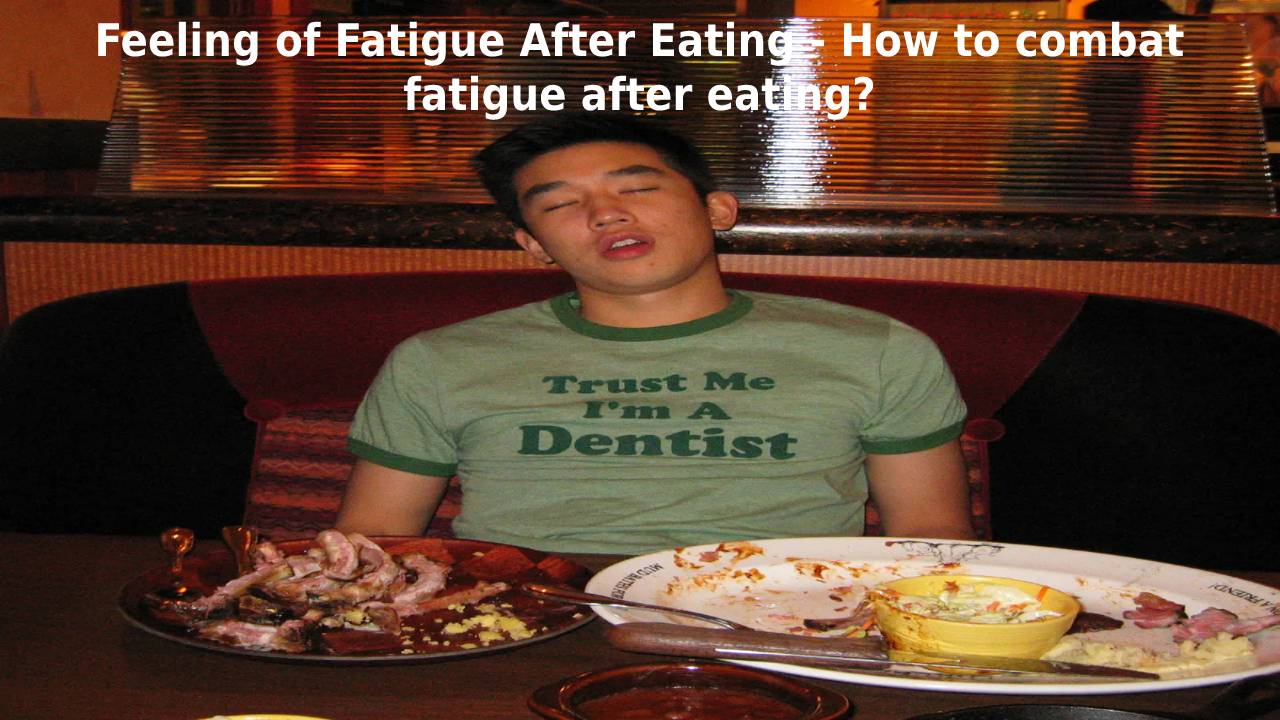
Table of Contents
Feeling of Fatigue After Eating
Everyone has experienced an unpleasant feeling of fatigue after eating at least once in their life.
In general, after a wealthy meal or after introducing foods that are difficult to digest or too elaborate.
The symptoms that are felt immediately after the meal are exhaustion and tiredness, accompanied by the need for sleep.
In some cases, the discomfort is much more pronounced and can include tachycardia, pain in the center of the chest, and tightness in the chest.
Especially on holidays, people tend to eat more, access to the emergency room increases due to too great and heavy lunches.
But what are the causes of this feeling of discomfort after meals? Let’s see some explanations about it and try to correct eating habits to minimize this disorder.
How to combat fatigue after eating?
- Feeling tired after a meal is wholly normal.
- If you feel tired after a meal, there is a good chance your body will respond to all the biochemical changes caused by digestion. In other words, it is entirely normal.
- However, if the symptom is disruptive or changing your lifestyle doesn’t seem to help, it might not hurt to talk to your doctor or ask a dietician for help.
- Once you have ruled out any specific gastrointestinal disorders, you need to correct your eating habits to combat this feeling of fatigue after eating.
So let’s see some helpful tips to stay active and alert after meals.
1. Eat regular and balanced meals
- Skipping meals or eating too little for breakfast, for example, leads you to arrive at the next meal with immeasurable hunger.
- The consequence is to overeat and introduce excess food, increasing the risk of straining the stomach and gastrointestinal system.
- The after-meal will therefore engage our body in channeling all available energy into the digestive process.
- It will show us the bill by presenting tiredness and the desire to rest.
- It is better to have regular meals and the right quantities without overdoing the portions or reducing them too much.
2. Prefer light foods to combat fatigue after eating
- Junk foods and all foods that are exceptionally high in fat and seasonings slow down the digestive process.
- Therefore, it is better to prefer light and not elaborate dishes that do not require too much effort from the body during digestion.
- If you overdo it with lunch or dinner, you can also opt to end the meal with a hot drink. A light tea or herbal tea can aid digestion.
- It’s best to limit coffees too. Although it is considered the ideal drink to stay awake and active, excessive
consumption can produce the opposite result, causing a slump in energy.
3. Your Sleep Habits
- Unsurprisingly, not getting enough sleep can also affect how you feel after a meal. If you are relaxed and complete, your body may feel extra resting, especially if you didn’t get sufficient sleep the night before.
- The Mayo Clinic advises sticking to a regular sleep plan, limiting stress, and including exercise as part of your daily routine to help you get a better night’s sleep.
- While they also recommend avoiding midday naps if you have trouble getting a good night’s sleep, at least one study has found a post-lunch rest to improve alertness and mental and physical performance.
4. Your Physical Activity
- In addition to assisting you to sleep better at night, exercise can keep you alert throughout the day, minimizing the risk of a post-meal slump. Several studies have found that regular exercise helps raise energy and decrease fatigue.
- In other words, being sedentary doesn’t form some reserve of energy that you can tap into at will. Instead, being active helps you have the power to get through your days.
5. Drink Coffee In Moderation to combat fatigue after eating
- “Coffee can provide a rapid boost of energy, but remember: what goes up must come down,” observes Moskovitz.
- “You may notice an immediate improvement in motivation and focus, but once the caffeine wears off, you can go back to square one or even more tired than before.
- That said, coffee can certainly be safe in moderation, or less than 400 mg. per day, depending on the person, but it’s best to understand the real cause before ignoring it with caffeine. “
6. Try A Chromium Supplement
- Chromium can take every day “to stabilize blood sugar,” explains James. He recommends taking 300 mg at lunch and dinner to control small fluctuations in blood sugar and, therefore, energy.
- However, everyone is a little different, so what works for one person may not work for another.
- Your physician or nutritionist can help you decide what is best before making any significant changes to your diet.
7. The Digestive Cycle
- Your body needs the energy to function, not just for running or exercising in the gym, but just for breathing, thinking, etc.
- All our energy is obtained from food.
- Food is turned into fuel (glucose) by our digestive system.
- Hormones such as Cholecystokinin (CCK), Amylin, and Glucagon are free after a meal and increase the feeling of fullness (satiety).
- As blood sugar levels increase, insulin is produced to allow this sugar to pass from the blood and into the cells, used for energy.
- After the meal, hormones are also produced that induce a state of drowsiness.
- One of these hormones is serotonin. Another important sleep-inducing hormone is melatonin.
- Melatonin is not released directly in response to a meal; however, food can affect its production.
Also Read: Cocoa Butter – Incredible Health Benefits of cocoa butter on the skin


